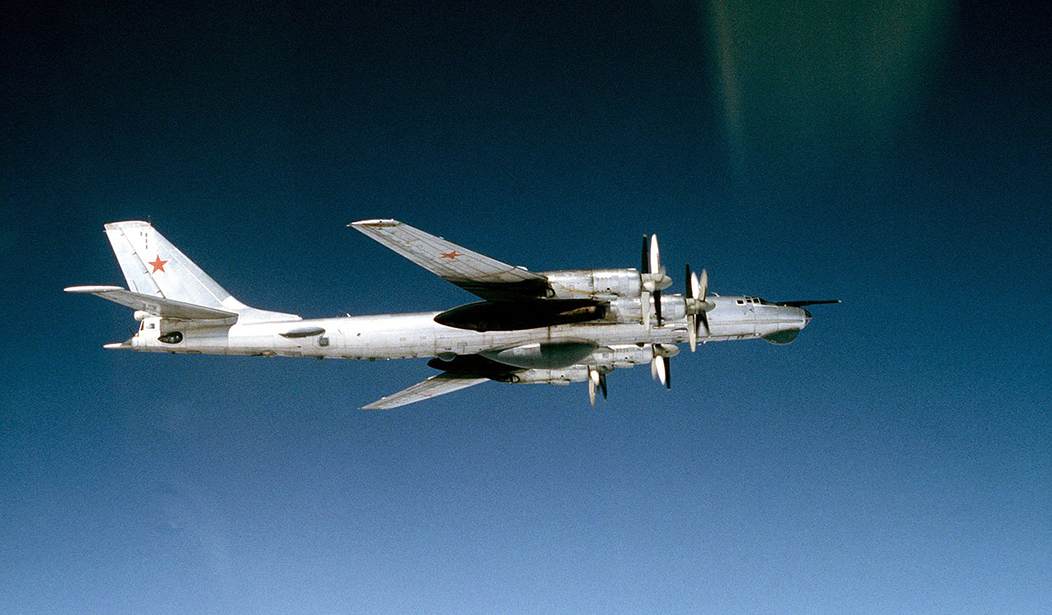Russia is at it again, playing old Cold War games. In the latest, North American Aerospace Defense Command (NORAD) aircraft were scrambled to intercept two Russian Tu-95 Bear bombers and two Su-35 Flanker fighters that were trailing their coats down the Alaskan coast, flying not in United States airspace but in the Alaska Air Defense Identification Zone.
A NORAD news release issued Wednesday says the four Russian aircraft remained in the Alaska Air Defense Identification Zone throughout the 15-hour flight and did not enter sovereign U.S. airspace. A NORAD spokesperson on Thursday identified the aircraft as two Tu-95 Bear bombers and two Su-35 Flanker fighter jets.
The Tu-95 "Bear," we might note, is a nuclear-capable aircraft, not that these examples were liable to be carrying any hot rocks. It's unclear which variant of the Bear these aircraft were; the standard Tu-95 is a bomb and missile carrier, while there is a maritime patrol/reconnaissance variant, the Tu-142 or "Bear F," dedicated to maritime reconnaissance and antisubmarine warfare. These are old aircraft, having entered service with the Soviet Air Force in 1956, but (like our B-52) are still useful, with tremendous range and a good payload capacity.
It's not like Russia is intending to start a shooting war with these antiques in any case; this is just the resumption of some standard old Cold War games.
Russian aircraft regularly fly through the Alaska air defense ID zone, and the news release says U.S. and allied military officials don’t see it as a threat. University of Alaska Fairbanks military affairs expert Cameron Carlson says international law permits those flights.
“They’re not penetrating the sovereign territory of these nations,” he said. “They’re going in there, and they have by international law the capability to do so. And understandably so, other countries would scramble their aircraft in response.”
Of course - they do it to us, and we do it to them, too, in the air and on the seas. That's the Cold War in a nutshell.
See Related: In Nuclear Apocalypse, How Safe Is Your State?
Putin Signals Willingness to Talk... With Trump. Not Biden.
In 2009, the State Department even issued a statement on the matter, titled "Maritime Security and Navigation," which states in part:
U.S. policy since 1983 provides that the United States will exercise and assert its navigation and overflight rights and freedoms on a worldwide basis in a manner that is consistent with the balance of interests reflected in the Law of the Sea (LOS) Convention. The United States will not, however, acquiesce in unilateral acts of other states designed to restrict the rights and freedoms of the international community in navigation and overflight and other related high seas uses.
In other words, yes, we're going to keep exercising our rights to free navigation of the seaways and international airspace, and if that means every now and then our Navy will send a small task group down the Taiwan Strait to exercise our nation's rights to free navigation of international waters, well, Chairman XI, you'd better just suck it up.
So, yes, this is routine. Just another remnant of the Cold War, for which Tsar Vladimir I seems really nostalgic, and if the timing is inappropriate, well, then it is, and that's all.
Just think of it as a big "Merry Christmas, tovarishchi, from the Russian Air Force!"
To keep yourself up to date on domestic as well as international shenanigans, consider upgrading to a VIP account. VIP status will open a plethora of stories and podcasts here at RedState. A Gold-level account gets you access to all of our sister sites in Townhall Media: PJ Media, Twitchy, Hot Air, Bearing Arms, and Townhall.com, while the Platinum level gets you all that plus access to a catalog of feature-length films, and a credit to the new Townhall store. Use promo code FIGHT through December 31st for a 60% discount!














Join the conversation as a VIP Member